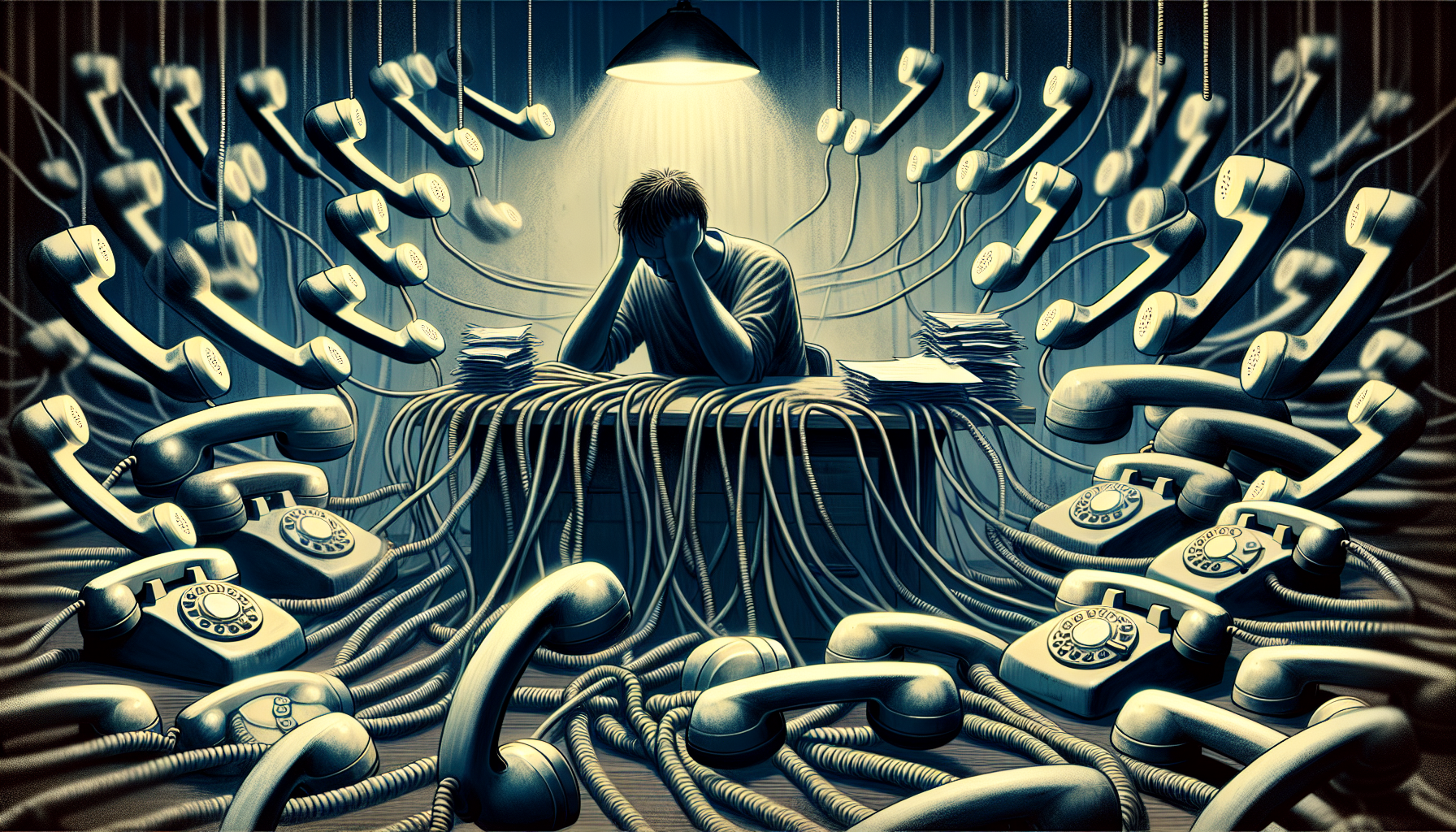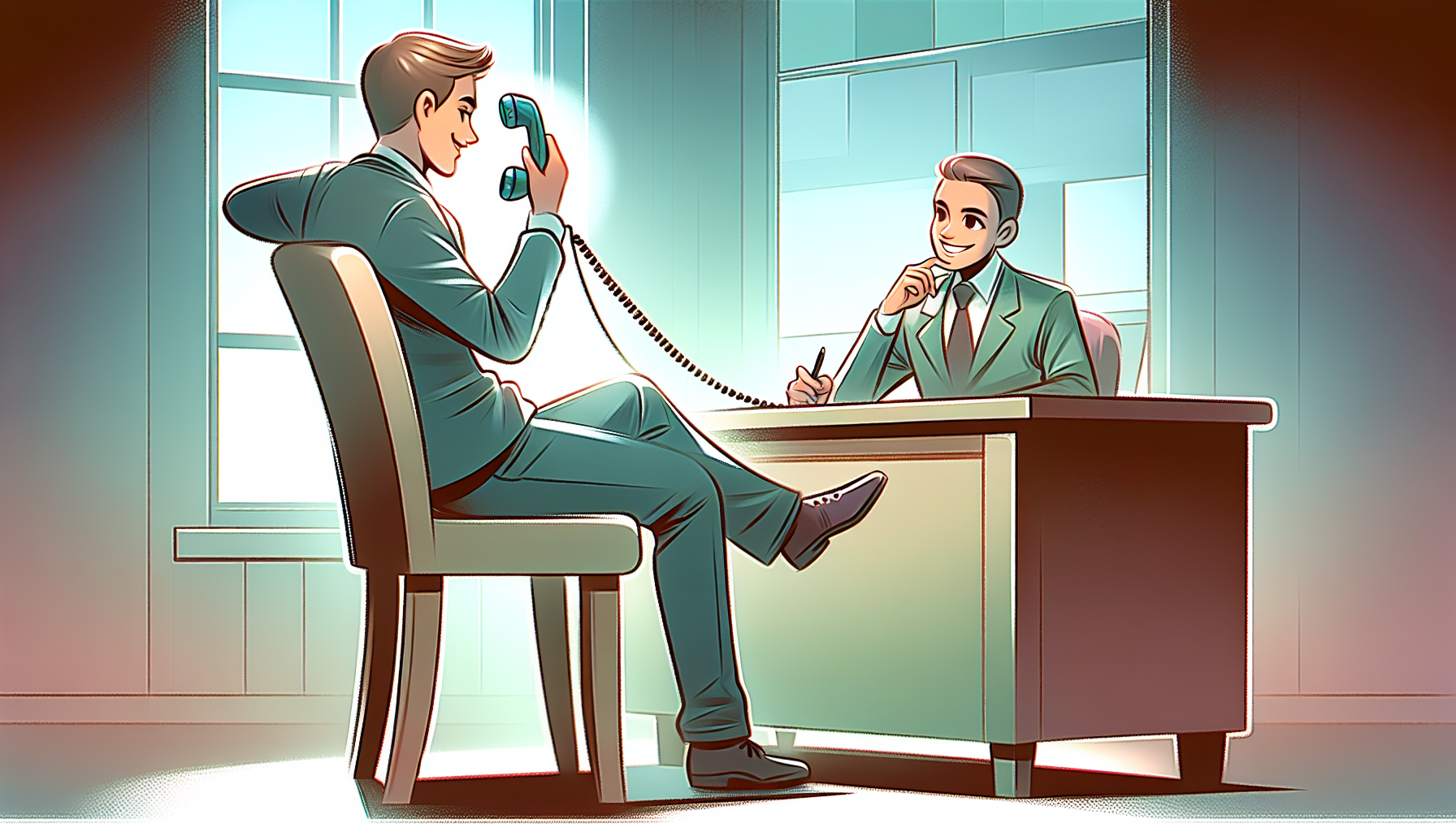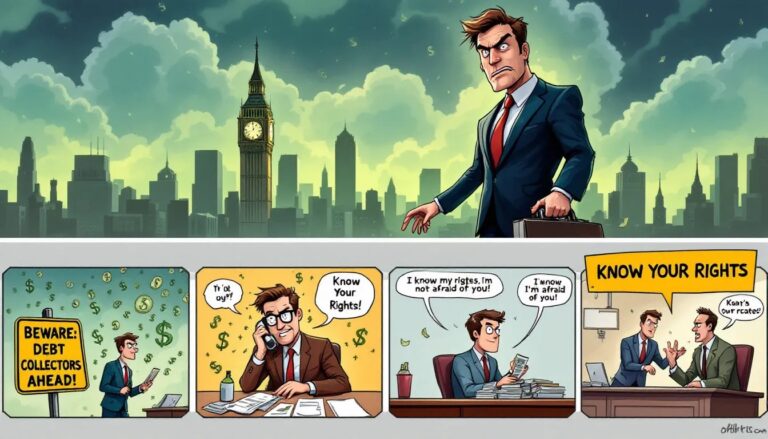Silence Harassing Calls: Learn the 11 Word Phrase to Stop Debt Collectors
Are you seeking relief from persistent debt collectors? The so-called 11 word phrase to stop debt collectors promises a quick fix but may fall short of a real solution. Our guide won’t just throw words at a complex problem—it dives into effective, lawful strategies that truly put you back in control of your financial situation.
Key Takeaways
- The ‘11-word phrase to stop debt collectors’ is a marketing myth and does not legally compel collectors to stop contacting you.
- The Fair Debt Collection Practices Act (FDCPA) provides the legal framework for consumers to manage collection attempts and outlines specific rights, including submitting a written request to stop a debt collector’s calls.
- While the FDCPA provides protections, practical long-term debt management solutions include debt consolidation, credit counseling, and directly negotiating with creditors.
The Truth Behind the 11-Word Phrase
Have you heard about the 11-word phrase to stop debt that supposedly stops debt collectors in their tracks? It’s a tantalizing idea, especially when you’re desperate for relief from the incessant calls and letters. The phrase, a marketing myth, has been circulating as a magic bullet to end all debt collector contact. While it’s true that specific words have power, the reality of stopping debt collectors isn’t quite so simplistic. This particular phrase is a product of clever advertising, designed to sell books and services.
The allure of an instant fix is hard to resist, especially when it’s endorsed by credit experts like John Ulzheimer on prominent platforms like the Larry King Show. But it’s essential to peel back the layers of this marketing strategy and look at the practicality and legality of using such a phrase. Simply uttering eleven words won’t change the fact you owe money, nor does it stop creditors from reporting your debt.
Origin of the 11-Word Phrase
The 11-word phrase to stop collections has a long history, originating as a clever marketing gimmick crafted by John Ulzheimer to promote the book ‘Credit Secrets’. The phrase, which is “Please cease and desist all calls and contact with me immediately,” was touted as a powerful tool to stop debt collectors dead in their tracks. It was during the height of this book’s promotional campaign that Ulzheimer highlighted the phrase’s supposed effectiveness on the Larry King Show, thereby cementing its place in the minds of consumers as a go-to solution for dealing with collectors.
But as with all things too good to be true, the phrase’s intended purpose was to boost book sales rather than provide a legitimate debt solution. The reality is that the phrase’s effectiveness in the real world is far from what was promised in those promotional materials. It’s crucial to understand the difference between what sounds good in theory and what actually holds up under legal scrutiny.
Why It Doesn’t Work
So, why doesn’t this 11-word phrase work? The truth is, debt collectors have a legal right to pursue collection actions, and simply saying a phrase doesn’t dissolve your debt or stop the reporting of it. It’s not a magic wand that can instantly erase obligations or legal proceedings. In fact, relying solely on this phrase and ignoring debt collectors can escalate the situation, potentially leading to lawsuits and default judgments if you fail to respond.
There are numerous situations where this phrase may not be effective, and expecting it to work as a universal solution can make your financial situation worse. The world of debt collection is governed by specific laws and regulations, so it’s vital to approach this issue with strategies that are legally sound and proven to work.
Your Rights Under the Fair Debt Collection Practices Act (FDCPA)

It’s not all doom and gloom, though. There’s a beacon of hope for consumers in the form of the Fair Debt Collection Practices Act (FDCPA). This legislation was established to:
- Stop debt collectors from stepping over the line
- Protect your rights throughout the debt collection process
- Provide a shield against the onslaught of debt collector calls
- Offer a set of tools to help you manage, and if needed, ignore debt collectors under specific conditions.
The FDCPA is quite clear about what constitutes fair debt collection practices, and it outlines what a debt collector can and cannot do when attempting to collect debts. It gives you leverage to stop unwanted contact and ensures that debt collection agencies, including the debt collection agency in question, adhere to ethical and legal standards. Knowing these rights is the first step to regaining control over your financial situation and peace of mind.
Prohibited Collection Tactics
Under the FDCPA, certain collection tactics are strictly off-limits for debt collectors. They cannot engage in:
- Harassment, such as making repeated calls with the intention to annoy or using abusive language
- Making any false representations about the debt, including misrepresenting themselves as attorneys or government representatives
- Threats of legal action that aren’t actually intended or permissible
These actions are a clear violation of the FDCPA.
If you’ve sent a cease and desist letter to stop collection calls, debt collectors are legally required to comply, with the exception of a single final notice or unless they’re informing you of specific legal action. This prohibition includes any additional unwanted contact or attempts to collect charges not authorized by law or your original agreement. It’s empowering to know that the law states there are boundaries set to protect you from overzealous collection agencies.
How to Report Violations
When a debt collector violates the FDCPA, it’s not just a breach of etiquette; it’s a breach of federal law. You have the right to report any such violations to the Consumer Financial Protection Bureau (CFPB) or the Federal Trade Commission (FTC). Many states also have their own laws similar to the FDCPA, and in most states, you can reach out to your state attorney general’s office to report state-level infractions.
Should you decide to take legal action against a debt collector for FDCPA violations, you may be entitled to recover damages, including attorney’s fees. It’s a bit like turning the tables — if they’ve caused you undue stress or financial harm, you can hold them accountable in court. If you’ve already sent a cease and desist letter and the collector continues to call, don’t hesitate to report them to the appropriate authorities, including your Attorney General as well as the CFPB.
Legitimate Ways to Stop Debt Collector Calls

Now, onto the real solutions that can help you silence those harassing calls legally. There are several legitimate ways to stop debt collectors from contacting you. These aren’t quick fixes or empty promises but are rooted in the fair debt collection practices established by law. Whether it’s a written request to stop calling, a debt validation letter, or even taking legal action, these steps can provide the relief you’re seeking.
Remember, using these methods doesn’t make your debts vanish into thin air. You’re still responsible for what you owe, and paying off your debts is the most foolproof way to end collection calls for good. However, these are effective tools to manage the situation and buy time while you work on a long-term debt solution. So, let’s explore these strategies one by one:
- Negotiate a payment plan with your creditors
- Consider debt consolidation
- Seek credit counseling
- Explore debt settlement options
- File for bankruptcy (as a last resort)
Written Request for Ceasing Communication
Sending a written request is a powerful step you can take to stop debt collectors from contacting you. This isn’t just any request; it’s a formal cease communication notice that legally binds debt collectors to stop calling and sending letters. However, this doesn’t eliminate the debt or prevent them from reporting it to credit bureaus. It’s important to send this request via certified mail with a return receipt to confirm the collector’s receipt.
When drafting a cease and desist letter, follow these guidelines:
- Be clear and concise.
- Include your account numbers.
- Explicitly demand that all forms of communication cease.
- It’s often recommended to send a separate letter for each debt you wish to address, even if they’re held by the same collection agency.
For consumers who are judgment-proof — meaning they have no assets a collector or federal court could legally seize — this written request can be a way to stop collection calls if they are unable to pay the debt.
Debt Validation Letter
Another effective tool in your arsenal is the debt validation letter. This letter is not just about stopping debt collectors; it’s about making them prove that the debt they’re trying to collect is valid and indeed yours. It’s a right granted to you under the FDCPA, and it forces collectors to provide documentation that substantiates their claims.
You can request additional details such as the reasons for the debt, its age, and the collector’s licensing information. Responding promptly to this letter is crucial, as it allows you to confirm or dispute the debt, and keeping a record of all validation information is critical for verifying the collector’s legitimacy. It’s a step that can not only pause collection efforts but also protect you from paying a debt that may not be legitimately yours.
Hiring an Attorney or Filing for Bankruptcy
In more extreme cases, hiring an attorney to file bankruptcy, or considering bankruptcy may be necessary to stop debt collector calls. When you’re represented by an attorney, debt collectors are required to go through your legal counsel, which can prevent direct collection attempts. Filing for bankruptcy, on the other hand, triggers an automatic stay that halts all debt collection activities during the bankruptcy proceedings.
It’s important to understand that while these options can provide immediate relief from harassing phone calls, they do not eliminate your debt. Bankruptcy, in particular, is a significant legal step that can have long-term consequences for your finances, so it should be considered carefully and usually as a last resort.
Hiring an attorney can also be costly, but it may be worth the investment if you’re dealing with particularly aggressive bill collectors or complex debt situations.
Tips for Dealing with Debt Collectors

Dealing with debt collectors can be intimidating, but you’re not without resources or strategies. By being proactive, you can protect yourself and even outsmart the collectors.
The following tips can help you navigate these challenging interactions and keep you on the right side of the law.
Staying Calm and Professional
One of the most important things to remember when dealing with debt collectors is to stay calm and professional. Your demeanor can significantly influence the outcome of the conversation. Being respectful and cooperative can make the collector more likely to work with you to find a solution. If you find yourself becoming overwhelmed on a call, it’s okay to take a moment to step away and collect your thoughts before continuing the discussion.
Recognizing that both you and the collector have the mutual goal of resolving the debt can help keep the conversation focused and productive. It’s easy to get defensive or emotional, but maintaining a level head and clear communication will benefit you in the long run.
Keeping Detailed Records
Another key tip is to keep meticulous records of all your interactions with debt collectors. Documenting communications can safeguard your legal interests and provide essential evidence in case of disputes or legal actions. Always double-check the accuracy of the information provided by collectors against your own records to prevent any wrongful claims.
If you reach an agreement with a creditor, ensure that it is secured in writing. Having a written record of negotiated terms can prevent misunderstandings and will be invaluable if you need to enforce the agreement later on. Detailed notes taken during negotiations will also serve as a consistent record, supporting any future references or disputes.
Knowing Your Rights
Empower yourself by knowing your rights under the FDCPA. Debt collectors cannot engage in harassment, use misleading tactics, or engage in unfair practices. They are restricted in their debt collector contacts with others regarding your debt, and there are strict rules about when and where they can call you. If a collector crosses these lines and causes harm, they can be held accountable through legal proceedings.
Being aware of these protections can help you manage interactions with debt collectors assertively and confidently. It’s not just about knowing what they can’t do — it’s also about understanding what actions you can take to assert your rights and protect your peace of mind.
Long-Term Solutions for Debt Management

While stopping debt collector calls can provide temporary relief, it’s important to focus on long-term solutions for debt management. Whether it’s consolidating your debts, seeking credit counseling, or negotiating with creditors, there are strategies that can lead to a more stable financial future.
Incorporating these strategies into your financial planning can help you reduce the burden of debt over time. Not only can they stop debt collectors by addressing the underlying issues, but they can also help you rebuild your credit and regain control over your finances.
Debt Consolidation
Debt consolidation can be a game-changer for those juggling multiple high-interest loans. By merging these debts into a single loan, you simplify your repayments and potentially secure a lower interest rate, making it easier to pay off the original debt first. It’s particularly beneficial for those who have improved their credit scores since taking on the original loans and are looking to streamline their finances.
However, it’s essential to be aware of any additional costs associated with debt consolidation loans, such as origination fees or balance transfer fees. While you might enjoy lower monthly payments, extending the loan term could result in paying more interest over time.
Credit Counseling
Credit counseling is another invaluable resource for those seeking long-term debt management solutions. It offers the following benefits:
- Thorough assessment of your financial situation
- Follow-up sessions to craft a personalized plan for managing your debt
- Better understanding of your budget
- Offer classes to boost your financial literacy
- Provide free educational materials
Reputable credit counseling organizations can help you take control of your credit card debt and improve your financial situation.
When choosing a credit counseling service, look for one with transparent fees and accredited counselors. These organizations should provide free initial information without requiring personal financial details upfront. An accredited or certified credit counselor can offer trust and credibility, ensuring you’re receiving advice from a knowledgeable professional.
Negotiating with Creditors
Negotiating directly with creditors is yet another strategy that can be more effective and less costly than using debt settlement services. By taking charge of the negotiation process, you can potentially settle debts for a lesser amount and maintain control over the terms. Creditors may be more receptive to a settlement if you offer a lump sum payment, as this provides them with immediate funds.
It’s important to be honest and consistent in your communications with creditors about your financial situation. Establishing trust can lead to more favorable negotiation outcomes. After reaching a settlement, original creditors engaging in credit repair activities is crucial for improving your credit score over time.
Summary
To wrap things up, don’t let the idea of an 11-word phrase fool you into thinking there’s an easy way out of debt collector calls. The path to financial relief is paved with knowledge, strategy, and action. By understanding your rights under the FDCPA, utilizing legitimate methods to stop harassing calls, and implementing long-term debt management solutions, you can navigate the complex world of debt collection with confidence.
Remember, while phrases may not have the power to stop debt collectors, your actions and knowledge do. Stay informed, stay calm, and take control of your financial destiny. Let this be the start of your journey towards a debt-free life and the peace that comes with it.
Frequently Asked Questions
What is the 11 word credit loophole?
The 11 word credit loophole does not exist, despite common misconceptions. If you’re wondering, the phrase “Please cease and desist all calls and contact with me immediately” is often mistakenly believed to have special legal power.
How do you outsmart a debt collector?
To outsmart a debt collector, keep a record of all communication, send a Debt Validation Letter, write a cease and desist letter, review your credit reports, and explain that you cannot afford to pay. These steps can help protect your rights and manage the situation.
What should you not say to debt collectors?
You should never give out personal or sensitive financial information to debt collectors unless you are certain they are legitimate. Be cautious and protect your personal information.
What should I do if a debt collector violates the Fair Debt Collection Practices Act (FDCPA)?
If a debt collector violates the FDCPA, you can report them to the CFPB, FTC, and your state attorney general’s office, and consider suing for damages. Take action to protect your rights and hold the debt collector accountable.
How can debt consolidation help me manage my debt?
Debt consolidation can help manage your debt by combining multiple debts into one loan with a potentially lower interest rate, simplifying your payments and potentially reducing the total amount you pay over time.









